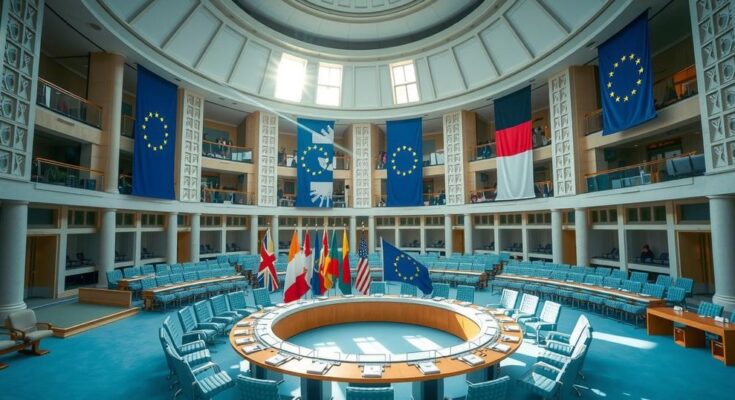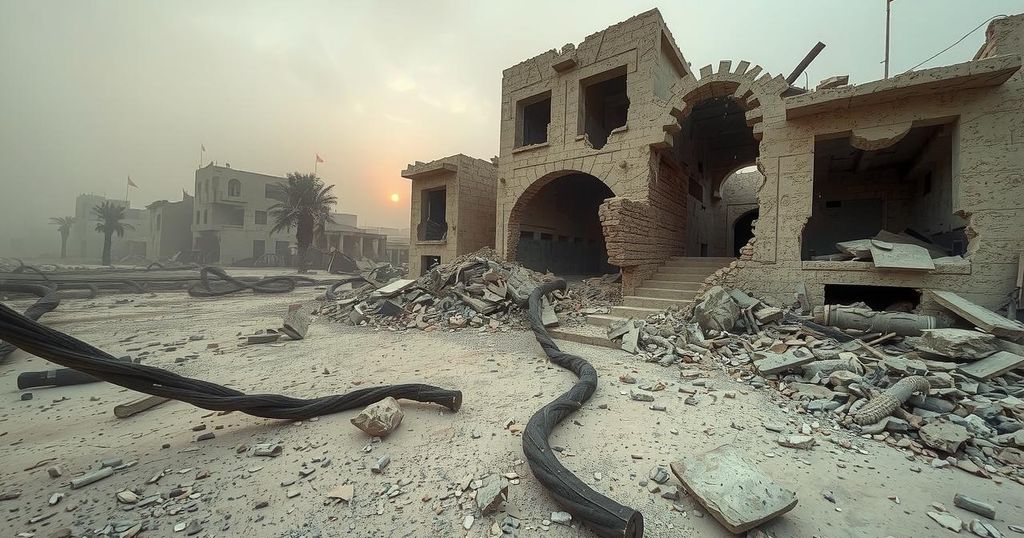European nations pledged nearly $6.5 billion to aid Syria’s reconstruction after 14 years of civil war. The aid will directly support Syria’s new leadership, focusing on infrastructure rebuilding and fostering a peaceful political transition. Notably, the conference marks a shift in aid strategy, as funds will be allocated directly to the Syrian government.
The recent 9th International Conference in Support of Syria, held at the European Council headquarters in Brussels, has seen European nations pledge nearly $6.5 billion towards rebuilding Syria, which has suffered from a civil war for over 14 years. Out of this commitment, $4.6 billion is designated as grants, and $1.7 billion will be offered as low-interest loans, marking a reduction from last year’s $8.1 billion.
This aid aims to assist the new leadership in Syria with infrastructure development and to promote a transition to peace. Unlike previous years, when funds were allocated to neighboring countries hosting Syrian refugees, this year’s funds will be channeled directly to the new Syrian government.
Ursula von der Leyen, President of the European Commission, emphasized the change in approach, stating, “In the past, we have worked for Syria and for Syrians. Today, we can finally work with Syria. The future of Syria is for all Syrians to build. For every step towards an inclusive political transition, the EU will step up its support.”
Current estimates indicate that 14 million people have been displaced by the war, with over half having fled Syria entirely after unrest began in 2011. Among those remaining, about 90% live below the poverty line, and 16.7 million are in urgent need of humanitarian aid, according to World Vision and UN reports.
The reconstruction costs of Syria’s damaged economy and infrastructure are projected between $250 billion to $400 billion. Ahmed al-Shara, the new Syrian leader, has appealed for international assistance to address these daunting challenges.
UN Secretary-General António Guterres expressed support in a video message, affirming, “The United Nations remains committed to helping Syrians build a country where reconciliation, justice, freedom, and prosperity are shared realities for all.”
The conference also highlighted concerning violence against minority communities in Syria, raising questions about the new government’s commitment to upholding minority rights. Syrian Foreign Minister Asaad Hassan al-Shaibani assured that all communities would receive aid and emphasized the need to facilitate the return of refugees, stating, “We believe in the true sense of citizenship, the citizenship of every single citizen of Syria, regardless of their ethnicity or religion.”
Notably, this conference marked the first appearance of Syrian authorities at the event, as reported by Radio France Internationale (RFI). While the U.S. has historically been the largest contributor to Syrian aid, Germany has taken the lead this year, pledging $326 million, with the UK contributing up to $208 million.
U.S. Deputy Assistant Secretary Natasha Franceschi remarked, “We will continue to provide certain assistance in line with US policies and laws, but we also now expect that other nations are going to help shoulder the financial burden.” Furthermore, EU Crisis Management Commissioner Hadja Lahbib stated, “We will give more, but we cannot fill the gap left by the US. We will need to share the burden.”
The international conference has paved the way for substantial financial aid to support Syria’s reconstruction efforts following years of civil war. European nations have committed significant resources directly to Syria’s new leadership, aiming to facilitate infrastructure rebuilding and promote a peaceful political approach. However, the road ahead remains challenging, with continuous humanitarian needs and the complexity of ensuring minority protections amidst the rebuilding process.
Original Source: allisrael.com




